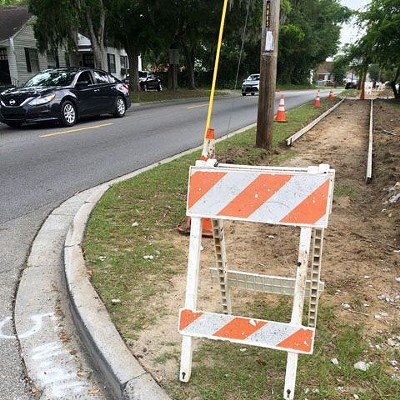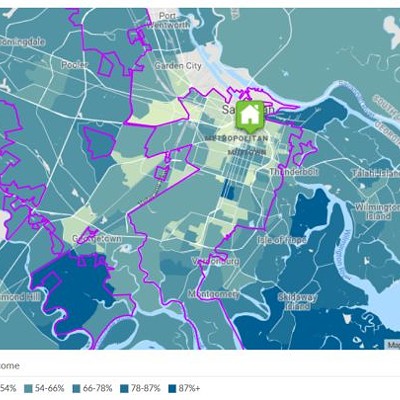AMIDST all the candy of the "Best of..." issue, I’ve decided to serve up some vegetables. We’re going to talk economics. No graphs, no number or equations—we’re just going to discuss forces, Market Forces, because it seems necessary.
Last Wednesday evening I attended the “Savannah Forward” meeting for District 2, that of alderman Bill Durrence. District 2 covers all of the National Landmark Historic District, the Victorian Historic District, the Thomas Square Streetcar Historic District, and Baldwin Park, among other downtown-adjacent neighborhoods, all historic to some degree, and all under some degree of development pressure.
One would be justified in assuming that there are a large number of very educated people in this region, and that they would be very well-represented among the self-selecting citizens that make time to attend a forum like Savannah Forward.
However, a great many of them seem to have a willful or unwillful ignorance about Market Forces, especially as how they relate to development and land uses.
In either case, I will attempt to use this column as a crash course in things a citizen should consider, before stating in a public forum what it is they would like to see on their block, in their neighborhood, or as a part of their city. If we would all do this, we could have more productive meetings, and a strategic plan that has some slim chance of meeting its stated goals.
A caveat: the following are gross simplifications of issues. Studies could be conducted and many papers written on any one. My pithy (I hope) insights will not be entirely accurate, simply due to brevity.
However, I hope that they will help readers to think about at least one of these issues in a different light. Still, feel free to write a comment about how wrong I am.
1. What are you willing to tolerate in order to get what you want?
The most absurd thing I heard at Savannah Forward, paraphrased: “I want more walkable conveniences in my neighborhood, but I don’t want more density.”
A citizen actually expressed these two conflicting ideas in one sentence. Many more expressed similar desires—to be able to walk to a drug store, or a grocery store, or even an insurance office.
They did not necessarily express a distaste for density simultaneously, but they certainly didn’t display a ready understanding that residential density is probably the best way to get to their goal.
The market does not care if you, personally, want more walkable conveniences. The market will take notice only when a large enough group of consumers with similar demands create profitable conditions within a certain geography. And you have to have the right zoning, too, but that’s a whole ‘nother can of worms.
Businesses need customers. Retail follows rooftops. Supply responds to demand. Simple market dynamics. Capiche?
2. Do you distrust, or even hate, the market?
This one may cause existential crisis and night sweats in certain conservatives. Trigger warning given.
Many citizens at Savannah Forward expressed that they did not want any more hotels or short-term vacation rentals (STVRs). I hope that none of these people watch Fox Business or consider themselves “free market conservatives,” because more hotels and more STVRs are most definitely what the market wants.
Now, even some conservatives will admit that the market can be wrong. Multiple suppliers (developers, landlords) could be rushing to meet the same demand, and end up creating an over-supply. Or, in their efforts to create supply, they could also be creating conditions that actually destroy the demand itself.
This is the “killing the goose that lays the golden egg” argument—too large a tourism sector will destroy the character of the National Landmark Historic District that most are here to experience. Where is the balance?
But the above arguments both presuppose that the demands of tourism should be met. There are others that simply say “no”—this demand does not need to be met. This segment hates the market. This is not a value judgment (at least from me).
It is fine to hate the market—just be willing to admit that you do hate it, and that you are in no way a “free market conservative,” and would like government to step in to curb the demands of the tourism sector.
You are callous to the market. Say it. And proudly wear your Bernie 2020 button.
3. Are you simply engaging in wishful thinking?
I would really like to own a copy of Amazing Fantasy #15. This is Spider-Man’s very first appearance. There are about 2,000 confirmed copies in existence, in reasonably good shape. There might be a total of 5,000 in varying conditions. Whatever the number is, it will never grow. Supply is limited.
A copy that had been sitting in a safe deposit box for over 35 years, so in very good condition, sold last year for over $450,000. Despite the fact that I think I deserve it as a lifelong fan of Spider-Man, and that I would take very good care of it, I will not attain a collector-grade copy of Amazing Fantasy #15 unless I come up with a lot of cash. The market is callous.
However, I can easily buy myself one of the many reprints issued over the years. In fact, I have several already. I might also be able to purchase a banged-up original copy, perhaps with scribbles on the cover, if I were to come across one.
Spider-sensing the metaphor yet?
Yes, we’re talking about downtown housing. Despite the wishes of the working class and the creatives that make downtown operable and interesting, the “affordable” stuff that is also historic is in short supply, and it is increasingly small, beat-up, or shared with too many roommates. This happens when a resource of static supply is subjected to increasing demand.
This is not to say that there are not remedies. We are seeing an increasing number of multi-family residential projects go up along the periphery of the Historic District. These are the reprints—available to the masses.
Hopefully the City will do what it can to encourage this trend, and to lower barriers to its construction. As a bonus, it should help create the conditions spoken of in No. 1 if the proper density is allowed.
But don’t expect to attain an original unless you can pay for it.
4. Are you just not willing to pay the price?
Proper pricing is the basis of any efficient market.
Price a product too high, consumers don’t buy it, and you are left with unsold stock on your hands, and valuable resources going unused (and perhaps a black market is given birth). Inefficiency.
Price a product too low, consumers buy it up quickly, you run out of it, and it might not go to those who have the highest and best use for it (and thus willing to pay more for it). Inefficiency.
Like it or not, parking is a product—a container to store personal property, the large and heavy device which you use to get from Point A to Point B. The scarce resource (at least downtown) consumed in providing this product is space.
Like it or not, the City is being a good steward of this scarce resource by raising its price. In fact, for maximum efficiency, it should raise the price until there is always a spot or two open on every block. For if all spaces are always full, then obviously the market will bear a higher price.
The market does not care if you, personally, cannot pay the price that is optimum for efficiency. In fact, if you can’t pay it, while others can, this forces you to change your behavior and seek an alternative—well, that’s not a bug, that’s a feature.
What is a bug, is if there is no viable alternative to shift to. However, if you are just unwilling to shift to the alternative, then the failure isn’t in the market.
Many seem to feel that they are entitled to cheap or free parking because they are locals and the resource is a public one. I hope that these people have never uttered the words “government should be run more like a business”.
I welcome your outrage.
In conclusion, I would ask the citizens of Savannah to spare more thought for the means before requesting the ends. And it’s not just me—I do talk to the people that work for the City, and quite a few real estate professionals. They would like to stop discretely rolling their eyes so much at public forums.
The thing you want, is it something that there is incentive for the private sector to provide? If not, do you have ideas on how to change conditions so that the private sector is incentivized (or dis-incentivized, in the case of hotels and STVRs), and can you deal with those changes? Or, is what you want something that must be accomplished by direct public sector action (yeah, taxes, government meddling, etc)?
Or, hybrid-style, is it something that you think the public sector should kludge the private sector into providing, because there is no natural incentive though it is a worthy goal? An example of this is “affordable” units in an otherwise market-rate development.
Let’s all think not just about what we want, but how we get to what we want, and accept that the means might actually be counter to what we imagine our economic ideologies to be. It will elevate the usefulness of our discussions about the future of Savannah, and our strategy to get there.





























